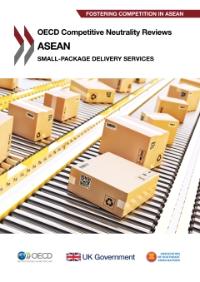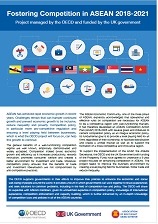Competition
Towards a Level Playing Field between SOEs and Private Entities in ASEAN
The ASEAN Competition Action Plan (ACAP 2016-2025) envisages a regional report on the impact on competition of state-owned enterprises (SOEs) and government-linked monopolies (GLMs) in ASEAN. Within this framework and in co-operation with the UK Government and the ASEAN Competition Authorities, the OECD has undertaken an assessment of special rights and privileges granted to SOEs and GLMs that may have a distortionary effect on competition in the logistics sector.
|
How to address these challenges?The OECD has built on its significant work on competitive neutrality, which is well suited to achieve these ambitious objectives. This work is specifically designed to identify shortcomings in national regulations and policies that hinder the efficient functioning of markets to the detriment of businesses and consumers.
|
||||||||||||||||||||||||||||||||||||||||||||
Four main outcomes out of the project | |
|---|---|
|
1 |
An OECD report describing the competitive situation for the key SOEs in the logistics sector and identifying any exclusive rights or special privileges granted to such SOEs, as well as their potential justification and rationale. |
|
2 |
Building on stakeholders’ comments and available data, analysis on possible improvements also in light of the international best practices and relevant case studies. |
| 3 | Workshops and meetings with government officials on identifying special rights and privileges for SOEs that hinder a level playing field, and less restrictive alternatives to achieve the same socio-economic objectives. |
| 4 | Recommendations to ASEAN governments on the special rights and privileges identified, in order to reduce competition distortions in the logistics sector. |
Beyond its immediate impact on competition policy, the project helps lay the foundations for reducing inequality, lower non-tariff barriers to trade, and improving the business environment and ease of doing business in ASEAN. A rule-based, predictable environment based on international best practices will ensure a competitive and open economy. This in turn will allow businesses seeking access to ASEAN to enter, operate and invest effectively.
Project Roadmap | |
|---|---|
|
1 |
Select the market where the analysis will be undertaken and identify the role of the SOEs |
|
2 |
Identify SOEs’ special rights and privileges |
| 3 |
Conduct an in-depth analysis of these special rights and privileges |
| 4 |
Formulate recommendations for reforming special rights and privileges, and assessment of viable alternatives, also in light of the SOEs’ rationale. |
| The launch of the report and the capacity building seminars took place in December 2020. | |
What's new?9 September 2021 The OECD Competitive Neutrality Review of ASEAN was launched during the 53rd ASEAN Economic Ministers Meeting.
|
Reports by country
 |
|
 |
|
 |
Lao PDR (forthcoming) |
 |
Malaysia |
 |
Myanmar (forthcoming) |
 |
Philippines |
| Singapore | |
 |
Thailand |
 |
Viet Nam |
PROJECT FLYER
[email protected] | @OECD_BizFin | #OECDcomp

Related Documents

